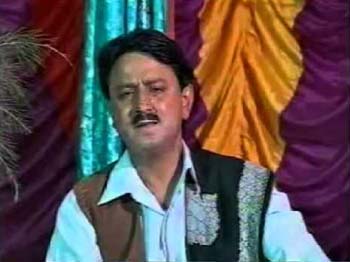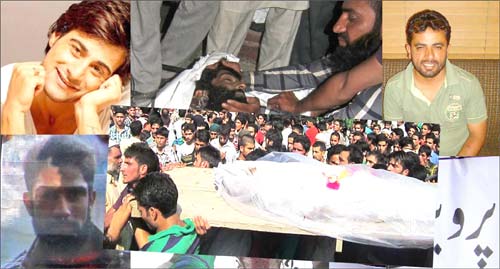One of the foremost features of Kashmir’s strife is that tens of thousands of people, men, women and youth, started moving out of their mountains to the plains in India for education, livelihood and trade. But the spate of mysterious deaths, being reported occasionally from various states, is posing a question mark over the unacknowledged integration that is taking place, reports Shah Abbas.
When Kashmiris were abuzz on social websites to discuss the Parvez Rasool’s selection in the Indian national cricket team, they had to post their comments on another Parvaiz next week. Not a cricketer this time, but a young boy from down town area, Parvaiz Teli, who died mysteriously in Mumbai, on his way to Goa.
The eruption of militancy had in a way brought alienated Kashmiris a bit closer to the people living in other states of India, because Kashmiri students and businessmen had no option other than India.
This was for the first time Kashmiris were “integrating” themselves to India, though under a compulsion. But India missed that chance as well because it could neither embarrass nor adopt the people of its “Atoot Ang” instead Kashmiris were arrested and harassed in every part of India. “Even now some of them are languishing in different Indian jails,” said a high court lawyer adding “they have been implicated in fake cases by the police only to get out of turn promotions and other cash rewards.”
Now when India has succeeded in curbing the militancy in Kashmir, courtesy a changed Pakistani policy, the distances between New Delhi and Srinagar, have not squeezed not even by Kashmiris travelling every nook and corner of India. “Delhi Hanooz Doore Ast” (New Delhi is still far away from Srinagar.)
Frequent and mysterious deaths of Kashmiris including a famous singer, religious youths and an aspiring model in different Indian states have in fact created a new wedge between India and Srinagar. But such incidents are not new.
On 7 December, 1992 a day after Babri Masjid was demolished by Hindu nationalists three Kashmiri students Farhat Razaq Wani, Javaid Indrabi and Hilal Bhat, who were studying at Aligarh Muslim University (AMU) were travelling home and accidently boarded Fayzabad bound ‘Special train’ meant to carry Kar Sevaks (Hindu fundamentalists who led the demolition).
As Kar Sevaks came to know that the trio belonged to Kashmir they pounced upon them (as recounted by sole survivor Hilal Bhat in a book titled Kashmir: The Case For Freedom) with tridents (an emblem of Lord Shiva carried by Kar Sevaks) and other sharp edge weapons. Hilal saved himself by pretending to be a Kashmiri Pandit. The other two Farhat from Islamabad and Javaid from Ratnipora Pulwama, were stabbed to death and thrown out of the moving train. Farhat’s dead body reached home three days later while Javaid’s family came to know about his whereabouts after a month’s time. Javaid’s body was found by a Muslim cleric in a small town called Bulland Shahar where he is buried.
Ghulam Nabi Sheikh, a noted singer and composer was allegedly killed by the Punjab police in the night of July 13, 2003.
Sheikh was allegedly murdered by the Punjab police when he was travelling in a train along with his daughter and a Kashmiri Pandit friend. The Punjab police cremated his body within hours after killing him presumably to destroy evidence. Sheikh’s death was shocking and was received with an outpouring of grief in Kashmir.
In 2007, the Punjab and Chandigarh High Court, which handled Sheikh’s murder and cremation case since 2003, asked Central Bureau of Investigation (CBI) to investigate Sheikh’s assassination. The criminal investigation body of India approached Sheikh’s family only once in 2007 and it’s yet to unravel the mystery surrounding the singer’s assassination.
While alive, he lent his soul-soothing voice to innumerable verses. He lived in the heart of masses. Ten years have passed the littered family of renowned singer, is scrambling for justice and un-Islamic funeral rites (cremation) in 2003 in Punjab.
The exact cause of his death continues to be a mystery. It is in this backdrop that Sheikh’s family members, relatives and fans impressed upon the government to dispense justice to the bereaved family by reopening the case.
“An impartial judicial probe was necessary into such deaths to stop any recurrence in future but who cares when victim happens to be a Kashmiri Muslim,” said advocate Tariq, who practices in a district court and works on an old criminal cases with political background.
In the month of June, this year, Amir Yousuf Mir, 23, who played a small role in famous Star Plus serial ‘Kasuti Zindagi Ki’ was found dead in Mumbai. Mir, a resident of Boniyar Uri in district Baramulla was a model by profession.
According to Amir’s family, they came to know about his death after Mumbai police informed them that he had committed suicide.
“We received a phone call from an inspector of Meera road police station Mumbai, and the police official claimed that Amir had committed suicide by hanging himself in a rented house” said a relative of Amir.
Rebuffing the Mumbai police claim that Amir had committed suicide, the family said that there was no reason for Amir to end his life.
“Amir was a successful model. He had received several awards and had been part of a famous Star Plus serial Kasuti Zindagi Ki. He had completed an acting course from the Balaji Telefilms and had participated in scores of fashion shows. He was in touch with the family and was expected to arrive soon at his native place,” one of the Amir’s family member said adding that Amir was a recognized figure in the modeling world and had several awards to his credit. “We apprehend he might have been murdered before hanging.”

The family had repeatedly appealed the state government to intervene so that the mystery of Amir’s death is solved but again the state authorities failed to satisfy its people and never came forward about the details of the mystery. Instead the local police relied on the investigation of the Mumbai police and accepted the findings knowing the fact that Kashmiris hardly trust any such probe.
Before Amir’s mysterious death in Mumbai, another Kashmiri youth was found dead in his hostel room of Hyderabad University.
Twenty-nine-year-old foreign Languages scholar, Mudassir Ahmad Malla, was released just two days ago for being part of demonstrations that took place after Afzal Guru was hanged secretly in New Delhi’s Tihar jail.
“Few students and a professor who taught Mudassir were annoyed with him for his bold participation in protests after Afzal’s hanging. He told us over phone that he exchanged heated words with him and finally they got him arrested. Two days after he was finally released from custody we received a call that Mudassir has hanged himself in his hostel room,” Ashiq Hussain Malla, brother of Mudassir told Kashmir life.
But the chief minister, Omar Abdulla’s statement about the death of Mudassir on the floor of state legislative assembly, shut all the tongues. “I am ready to share the details of the Mudassir death with the house but I need permission from the concerned family,” the chief minister said, reacting to the allegations of opposition.
More recently, Parvaiz Ahmad Teli, a down town youth was found dead in Mumbai, in mysterious conditions.
Parvaiz, a resident of Qalamdanpora, Nawab Bazaar, according to family sources had left home for Goa via Mumbai on July 2. Till July 6, Parvaiz was in Mumbai. Family sources said. He was working as a salesman in Bangalore for the past eight years. Soon after Parvez went missing, one of his brothers left for Mumbai to seek his whereabouts.
The family members alleged that there were torture marks on Parvaiz’s body. They even displayed some photographs of his body showing some marks of torture on his legs etc.
Sources said that Parvez and his friends had bought tickets at Mumbai to move to Goa by bus. However, according to his friends, once they reached the Bus Terminal, Parvaiz left to buy cigarettes, but did not return. His friends lodged a missing report with Police.
His body was found in Mumbai on July 9 near a gate of Boriwali Railway Station.
Chairman Hurriyat Conference (G) Syed Ali Geelani has suspected the hand of “communal elements and secret agencies” behind the killing of Parvaiz.
“Though people in Kashmir with their unique hospitality greet visitors and Yatris and take due care of them, however, India in return sends the dead bodies of our youth,” said Geelani while opining on the mysterious death of Parvaiz.
“This is the 3rd such incident this year when the dead body of a Kashmiri youth killed in mysterious circumstances outside the state was returned,” he said indicating to the death of Amir and Mudassir.
Hurriyat Conference (M) chairman, Mirwaiz Umar Farooq stated that Parvaiz’s death was a “cold-blooded murder”.
Mirwaiz said that APHC has time and again raised alarm that Kashmiri students and traders working outside the state are not safe.
“It was the duty of the government to provide security and safety to the traders and students working outside Kashmir,” he said.
Not only the separatists who are being considered as “outlaws” by the state police, but a lawmaker also smell foul in the mysterious death of Kashmiris in India.
“It is a continuous process to frighten Kashmiris and push them back to valley which has already turned into a huge jail for them,” MLA Langate, and Awami Ittihad Party president, Er Rashid said while reacting to the mysterious death of Parvaiz Teli.
Peoples Democratic Party (PDP) has demanded probe into the “mysterious” death of Parvez Ahmed Teli.
Meanwhile, Mumbai police has stated the “mysterious” death of Parvez Ahmad Teli, in Mumabi as “accidental” and has registered a case in this regard.
A communication from Mumbai police to J&K police states reads,“Accidental death report no. 88/2013 is registered at Mumbai Central Railway Police Station.”
A day after the mysterious death of Parvaiz Teli, Abid Ahmad Ganaie (21), another youth from Ganderbal district who was studying at Darul Uloom Faizani Madina in Gujarat’s Ahmedabad, was found dead in Udaipur area of Rajasthan.
Abid, a resident of Larsun, Ganderbal, had left the seminary around fifteen days back. He had informed the family that he was running short of money and wanted to come home.
Chief minister Omar Abdullah’s Political Secretary Tanvir Sadiq visited Larsun village to express solidarity with the family of the deceased youth perhaps because Abid belonged to the Omar’s constituency.
Tanvir, according to an official handout, said that “Chief Minister Omar Abdullah was pained to learn about the death of Abid.”
Earlier, on the instruction of the Chief Minister special arrangements were made to send two of his relatives to Rajasthan to bring back the body of Abid to Kashmir.
But the fact is that Abid’s death is shrouded by mystery and Omar Abdulla’s “pain” can’t be an answer to those who want to know the reason behind the deaths of Kashmiris in different parts of India.

















Chasham Qusha..worth reading and sharing
I was recommended this web site via my cousin.
I’m not sure whether or not this submit is written by him as no one
else understand such designated approximately my difficulty.
You’re amazing! Thank you!